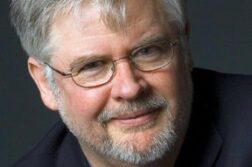HAROLD NORSE, whose iconoclastic poetry explored gay sexuality and identity and earned both wide critical acclaim and a large, enduring popular following, died of natural causes on Monday, June 8, 2009, in San Francisco, just one month before his 93rd birthday.
Born as Harold Rosen in 1916, in Brooklyn, N.Y., to an illiterate, unwed mother, he later rearranged the letters of his original surname to produce Norse, the name he used during a prolific, international literary career that spanned seventy years. His collected poems, In the Hub of the Fiery Force, was published in 2003, and he continued to read publicly into his nineties, bringing his work to a new generation. The American poet William Carlos Williams, who was Norse’s mentor, dubbed the Brooklyn native “the best poet of his generation.” At Williams’ urging, Norse moved beyond traditional verse forms to embrace “the American idiom” (that phrase became the title of the collected Williams–Norse correspondence, published in 1990).
While attending Brook lyn College, where he earned his B.A. in 1938, Norse and his lover Chester Kallman met and befriended W. H. Auden. Norse worked as Auden’s personal secretary until Kallman and Auden became lovers. “He always wanted me,” Norse later recalled fondly of his early acquaintance with Auden, “but I could never be with anyone that old.”
lyn College, where he earned his B.A. in 1938, Norse and his lover Chester Kallman met and befriended W. H. Auden. Norse worked as Auden’s personal secretary until Kallman and Auden became lovers. “He always wanted me,” Norse later recalled fondly of his early acquaintance with Auden, “but I could never be with anyone that old.”
Living in Greenwich Village in the 1940’s, Norse was active in the gay and literary undergrounds, befriending a young James Baldwin as well as Julian Beck and Judith Malina, with whom he helped found The Living Theater. In 1944, Norse met Tennessee Williams, with whom he shared a summer cabin in Provincetown while Williams completed The Glass Menagerie. During this period and later, Norse was close friends with the likes of Ned Rorem, James Jones, and Anaïs Nin.
Norse published his first collection of poetry, The Undersea Mountain, in 1953, and began to travel the world, going first to Italy, where he lived while working on a translation of the sonnets of Giuseppe Belli. In the early 60’s he lived in the famed “Beat Hotel” in Paris’s Latin Quarter with William Burroughs, Allen Ginsberg, and Gregory Corso, among others. There he helped develop the “cut-up” method of writing, a surrealist-inspired technique he used for his novella, The Beat Hotel, published in 1983. He traveled widely, meeting Leonard Cohen in Greece and staying for a time with Paul and Jane Bowles in north Africa.
Returning to the U.S. in the late 1960’s, Norse lived in Venice, California for a time, reconnecting with his friend Charles Bukowski, encountering poet Neeli Cherkovski, and working out at Gold’s Gym with a young Arnold Schwarzenegger. He settled in San Francisco in 1972, where he spent the rest of his life.
City Lights Books published his 1974 collection, Hotel Nirvana, which was nominated for a National Book Award. Carnivorous Saint, published in 1977, collected poems chronicling Norse’s gay erotic experiences from World War II through the Gay Liberation Movement. During this period, Norse was a regular at several North Beach coffee houses, where he often connected with fellow poet Bob Kaufman and other writers.
Norse received a National Poetry Association Award in 1991. His autobiography, Memoirs of a Bastard Angel, was published in 1989 and republished in 2002. During his final years, Norse continued to live in his cottage in San Francisco’s gritty Mission District, continually reworking his poems, seeing his work widely anthologized, giving readings, and corresponding with admirers from around the world. Reflecting on his storied life in a 2003 interview with the Review, Norse remarked, laughing, “Well, it was life. I thought everyone was living like that.”



